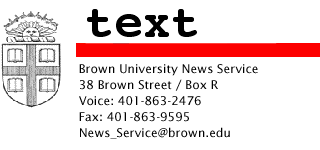Distributed April 24, 2003
For Immediate Release
News Service Contact: Mark Nickel
A message about SARS
Brown University will be guided by recommendations from the CDC
Provost Robert Zimmer and Executive Vice President Elizabeth Huidekoper distributed information about SARS to all members of the campus community. The text of their message follows here. (See also news release 02-120.)
April 24, 2003
Dear Members of the Brown Community:
We are writing to provide you with information about severe acute respiratory syndrome (SARS), to inform you about a possible SARS case being monitored by the University, and to describe Brown’s plans for monitoring and managing any SARS-related threat to the health of the campus community.
1. Where to find information.
This is important: On all questions related to SARS, the University will be guided by recommendations from the Centers for Disease Control. We strongly recommend that you visit the CDC’s Web site immediately (http://www.cdc.gov/ncidod/sars/), bookmark it in your Web browser, and refer to it whenever you have a question about SARS. The site is clear, authoritative, comprehensive and current. If you do not have convenient Internet access, you can get information through your supervisor, from Human Resources or at Health Services.
2. What is SARS?
SARS is an acute respiratory illness caused by a newly identified coronavirus and spread by close contact via droplet transmission, most likely through sneezing or coughing. It was diagnosed originally in China, Hong Kong, Vietnam and Singapore and has since been identified in Canada and the United States, probably spread by air travelers. Twenty-three probable or suspect cases of SARS have been identified in New England.
Symptoms of SARS include sudden fever (greater than 100.4° F), cough, shortness of breath, body or muscle aches, or overall discomfort. If you experience those symptoms within 10 days of travel to areas where SARS has been identified (China, Hong Kong, Singapore, Vietnam, Toronto, etc.) or within 10 days of close contact with a person with suspected SARS, you should seek medical advice. Students should telephone Health Services (863-1330) for instructions. Faculty and staff should contact their primary-care physician and should immediately inform Brown University Health Services if the diagnosis of SARS is being considered. Be sure to let your health-care provider know beforehand that you may have been exposed to SARS. For more information about the signs and symptoms of SARS, please visit CDC’s website. More detailed guidance on management of symptomatic persons who may have been exposed to SARS, such as how long you should avoid public areas, is available at the exposure management page of their Web site: http://www.cdc.gov/ncidod/sars/ic.htm.
3. Prevention and monitoring.
As with other infectious illnesses, one of the most important and appropriate preventive practices is careful and frequent hand hygiene. Thoroughly washing your hands often using either soap and water or waterless alcohol-based hand sanitizers removes potentially infectious materials from your skin and helps prevent disease transmission. The incubation period is typically two to seven days but can be as long as 10 days. If you believe you may have been exposed but do not have those symptoms, you need only monitor your health and practice good hygiene, particularly hand washing. As with any illness, if you have the symptoms described above, do not come to work or attend classes and try to avoid contact with others.
4. One case under observation.
The University and public health officials are monitoring one possible case of SARS. A faculty member in the Division of Biology and Medicine has experienced flu-like symptoms and has recently been in Toronto. Although there is no confirmation that this is a case of SARS, the University is following the recommendations of the CDC and is consulting with the Rhode Island Department of Health. Brown Health Services has contacted all students who attended a recent class lecture given by the professor to advise them of the situation. Brown Health Services has also contacted teaching assistants, laboratory staff and faculty colleagues who may have been in closer contact with the professor to provide them with specific recommendations for monitoring their own health. The professor is away from campus and will remain at home for a recommended period of time.
5. Travel advisory.
We are aware that May is a high-volume travel month, with students leaving campus for summer destinations and thousands of parents, guests and alumni arriving on campus for Commencement/Reunion Weekend. Although there are currently no SARS-related travel restrictions in place, the CDC advises that people planning elective or nonessential travel to mainland China and Hong Kong; Singapore; and Hanoi, Vietnam, may wish to postpone their trips until further notice. The World Health Organization is recommending that persons planning to travel to Toronto should also consider postponing all but essential travel to that city (http://www.who.int/en/). Visitors to Brown from these countries should postpone their trips if they are ill with fever, respiratory symptoms or if they have been exposed to someone with SARS. Faculty or staff who plan to travel to those destinations should consult with their department chair or supervisor and should postpone travel if at all possible. Anyone who is ill while traveling with fever and respiratory symptoms should visit a health care provider. The nearest U.S. embassy or consular office can help you find a provider in the area where you are traveling. You should also delay returning to campus. The CDC offers a travelers’ Web site at http://www.cdc.gov/ncidod/sars/travel_advice.htm.
6. University task force monitoring situation.
The University has organized a task force to monitor the SARS situation and to ensure that appropriate plans are in place to maintain the health of our campus community. That task force is in regular contact with the Rhode Island Department of Health, with faculty from the Brown Medical School, and with leadership from Brown Health Services. We will continue to keep you advised via the Brown University Web site, e-mails and appropriate postings.
Sincerely,
Robert Zimmer
Provost
Elizabeth Huidekoper
Executive Vice President for Finance and Administration
######





